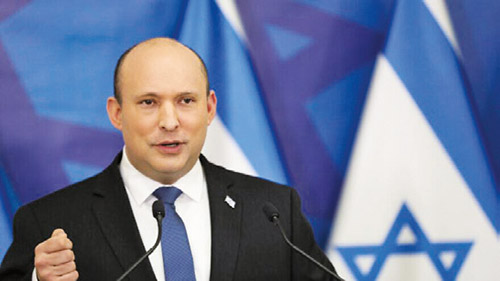

Bennett speaks with Putin, Zelensky; IDF soldiers assist in absorption process; refugees to receive free medical care.
Israel is committed to doing its part to both help mediate the current situation between Russian President Vladimir Putin and Ukrainian President Volodymyr Zelensky and assist any and all Ukrainian and Russian Jewish refugees who need its assistance.
Israeli Prime Minister Naftali Bennett spoke with Putin and Zelensky separately on Monday, March 14 in a continuation of his mediation efforts.
He spoke with Putin for about an hour-and-a-half, with the two men discussing efforts to reach a ceasefire in Ukraine, as well as
allowing access to Israeli humanitarian aid, reported Reuters. A separate statement from the Kremlin said Putin shared his assessment of the negotiation process with Ukraine.
On Twitter, Zelensky said that in talks with Bennett, along with the leaders of Poland and Luxembourg, they “exchanged information on our joint steps and steps of our partners against the background of Russian aggression. Agreed on further actions.”
Zelensky’s chief of staff, Andriy Yermak, praised Bennett’s mediation efforts. He wrote on Facebook: “Israel has taken on a complex but noble mission of an intermediary seeking peace and the end of Russian aggression against Ukraine.”
Bennett has held several calls with both leaders as part of an attempt to help mediate a solution to the war. He has also offered to hold a peace summit in Jerusalem.
On Monday, Israel also announced that it will build a NIS 21 million ($6.4 million) field hospital in Western Ukraine to help treat refugees, which will be funded by the Prime Minister’s Office, the Foreign Ministry and the Health Ministry, with assistance from the Schusterman Family Philanthropies.
In the meantime, Israel is preparing for an influx of refugees, as Ukrainian and Russian Jews flee to the Jewish homeland.
Ukrainian-speaking and Russian-speaking soldiers in the Israel Defense Forces will assist new olim from Ukraine and Russia throughout their absorption process, according to a joint statement by Israeli Defense Minister Benny Gantz and Immigration Minister Pnina Tamano-Shata.
In light of the significant rise in the number of arrivals from both countries who are eligible under Israel’s Law of Return for citizenship and residency, the ministers said that they planned to deploy both conscripted and reserve soldiers to accompany the arrivals from the time they land at Ben-Gurion International Airport and onwards.
The program is expected to be supported by a government decision on the matter.
The soldiers “will assist in the assortment and absorption process, but will not be authorized to themselves take any decision relating to judgment on receiving the oleh status, or relating to the Israel Population and Immigration Authority or any other benefit,” noted the statement.
Once these new olim arrive in the country, they will be provided with free medical care, courtesy of Israel’s Terem Medical Clinics, which will be providing free treatment to Ukrainian refugees who do not qualify to join a health fund.
Earlier this week, Knesset member Idit Silman (Yamina), who chairs the Knesset’s Health Committee, called on the country’s health and medical organizations to step up and provide care in Israel as “humanitarian aid.” Silman said, “It is important for us, as a Jewish state, not to stand aside when a serious humanitarian crisis occurs,”
Terem normally provides emergency screening and care, including treatments for various pressing injuries, heart attacks and other emergencies. However, the organization said that if Ukrainian citizens have other medical issues that need addressing, including receiving primary care or treatment for chronic diseases, it will also provide that support until they can return to their country.
Moreover, a spokesperson for Terem told JNS that the organization was in discussions with other companies about the possibility that the refugees will also receive free medicine.
Terem was already providing emergency medical treatment to foreign workers and asylum seekers living in the center of the country, especially in southern Tel Aviv, explained Natan Applebaum, Terem Medical Clinics’ CEO.
“We will now expand our services to the entire country,” he said. “Ukrainian refugees will be able to get care at any clinic, from Eilat in the south to Carmiel or Nahariya in the north. Once they are identified as refugees, they will have access to all of the center’s services.”
Israel has a socialized medical system that is operated by four large health funds. However, the system is only available to citizens in good standing (including new immigrants) and individuals in certain permanent-residency categories.
Tourists, diplomats, foreign citizens and foreign exchange students living in the country can opt-in for private health insurance options through the health funds, with prices ranging between 300 shekels ($90) and 2000 shekels ($610)—prices that could be too high for refugees who have been forced to leave everything behind.
Since the outbreak of the war on February 24, 2022, 5,598 Ukrainians who are not entitled to become Israeli citizens have entered the country, according to Israel’s Interior Ministry.













